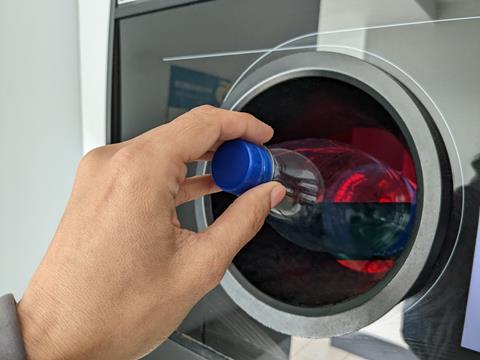
Fost Plus has outlined recent steps taken in Belgium to test out a smart deposit scheme for beverage packaging, including its own work with Fevia and Comeos to create a proposal for the technology, pilot projects carried out or planned in regions across the country, and dialogue held with local authorities.
The ‘Together for a Smart Deposit System’ initiative hopes to examine the viability of a smart deposit system in practice and, if it is successful, implement the technology in 2025. It unites Fost Plus, the Fevia and Comeos federations, and the Belgian drinks sector in this common goal.
Two pilot projects for a smart deposit scheme ran from late May until the end of June on the premises of the Corda Campus in Hasselt and KBC in Leuven. They aimed to test the effectiveness of unique codes on beverage packaging, the scanning process, the user-friendliness and operability of an associated app, the repayment of a deposit, and the fraud prevention and data protection measures put in place during the process.
These pilots were conducted in closed environments, but additional testing in semi-open and open environments is expected to take place in the future. These will focus on the system’s impact on litter and its ease of use amongst specific target groups.
Comeos, Fevia, and Fost Plus have also proposed a smart, digital deposit scheme to expand further on the Belgian recycling system. A feasibility study was carried out by consultancy firm PwC, apparently suggesting that such a scheme is the most effective method for reducing litter without sacrificing the country’s familiar blue bag system and disrupting consumer habits.
The companies have set out interim goals – as well as the technical, technological, legal, and communication issues involved in such a scheme – in a roadmap. This is thought to include the unique codes or the platforms required to run the system.
Fost Plus believes that a smart deposit system can ‘keep Belgium among the leaders in Europe as regards the collection and recycling of drinks packaging’ – also adhering to modern consumption trends outside the home and driving down the creation of litter.
An advisory panel for Flemish pilot projects has been set up in Flanders following a call to action from environment minister Zuhal Demir. Three of fourteen projects were selected, with two becoming concrete pilot projects; the next phase is set to take place in a semi-open environment and a test protocol has been drawn up.
Meanwhile, in Wallonia, Fost Plus is contributing to a study led by research firm RDC. Making use of the responses from the pilot projects, it is focusing on the range of deposit options available in Belgium, including digital, with results scheduled to be published this month.
Tests will also be carried out in the region over the course of this year to identify roadblocks in the rollout of incoming pilot projects, including its ‘white zones’, where there is no general access to broadband.
At the end of 2022, a study was completed in Brussels by Leefmilieu Brussel/Bruxelles Environnement at the initiative of the minister for the Environment and Public Cleanliness. It sought to weight up the potential effects of introducing a deposit scheme in the Brussels Capital Region with its high population density, spatial differences between districts, language barriers, and the high volume of newcomers identified as potential issues.
Now the Brussels Capital Region is said to be working alongside other regions to exchange knowledge and contributing to both the study in Wallonia and the advisory panel in Flanders.
Additionally, local authorities recently took part in four webinars designed to inform towns and cities, communes, and inter-municipal organisations about future developments and their roles in the project. The representatives were asked about waste collection in public places, with their answers expected to be processed further in future working sessions.
A digital deposit return scheme was trialled by Evian and re-universe at last year’s Wimbledon tennis tournament, with users entered into a draw to win two pairs of tickets to this year’s Women’s Finals.
More recently, Packaging Europe has been diving deeper into the industry’s perspective on the development of deposit return systems. We spoke to Jelena Petljanski Kis, sustainability and public affairs manager at Ball Beverage Packaging Europe, about a Serbian pilot scheme that uses smart technology to gather information on consumer interactions and scale up the system.
If you liked this article, you might also enjoy:
The Lidl approach to packaging sustainability
How did Brazil achieve its 100% aluminium can recycling rate – and can it be replicated in the EU?
Experts have their say on the EU’s Packaging and Packaging Waste Directive revisions
A deep dive into the most important packaging sustainability trends and solution















No comments yet